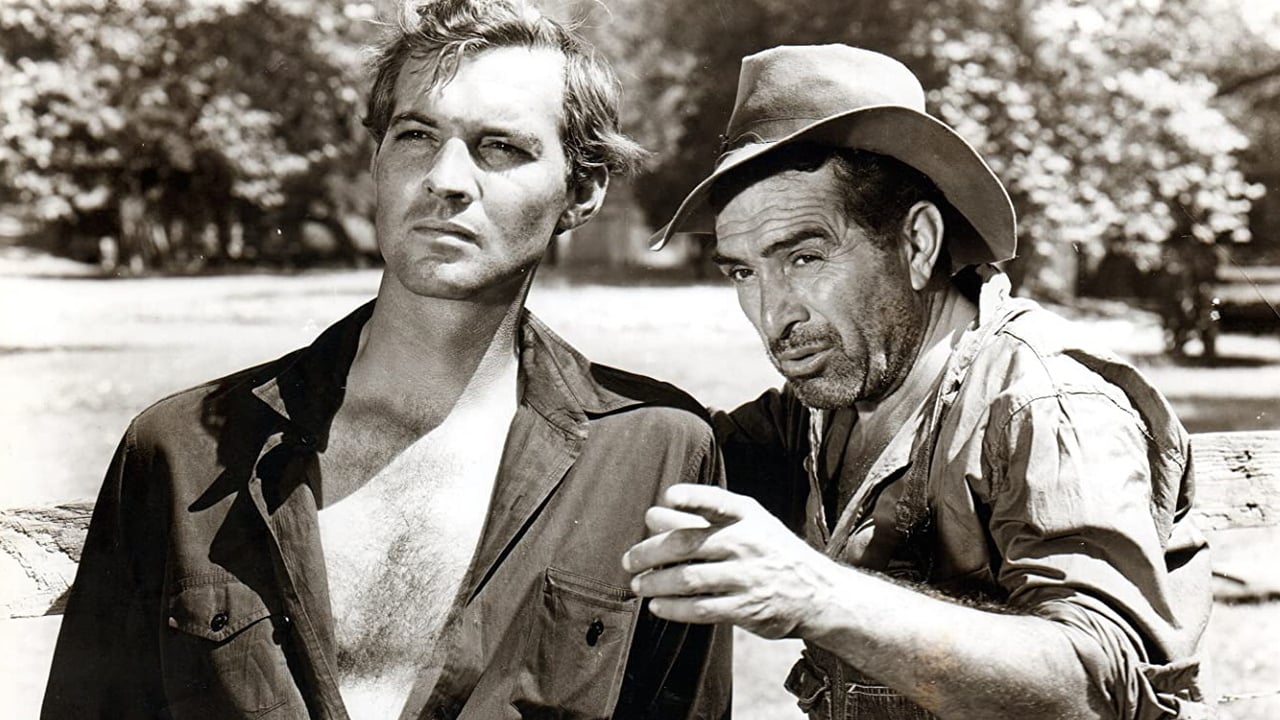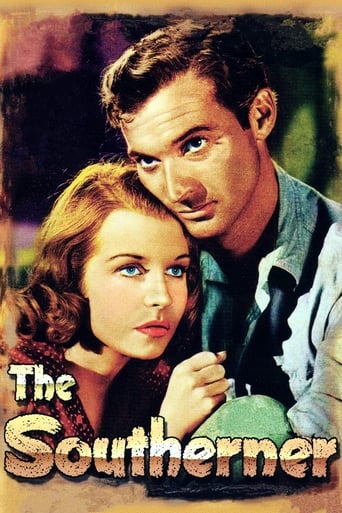CrawlerChunky
In truth, there is barely enough story here to make a film.
Ketrivie
It isn't all that great, actually. Really cheesy and very predicable of how certain scenes are gonna turn play out. However, I guess that's the charm of it all, because I would consider this one of my guilty pleasures.
PiraBit
if their story seems completely bonkers, almost like a feverish work of fiction, you ain't heard nothing yet.
Sameer Callahan
It really made me laugh, but for some moments I was tearing up because I could relate so much.
DKosty123
This take on the struggles of poor Americans in the south trying to make a go of it when they move onto a run down farm has a lot of the family type of stuff as a novel on America's depression should. Most of the cast of this is not as well known as the Henry Fonda Joad family epic, but that is different in a significant way. The Joads are in the process of trying to escape the dust bowl. This family relocates to the run down farm at the beginning of the film and then the story goes through their day to day living torments.French Director Renoir does a fine job assembling a story that makes a lot of sense and shows farm life struggles in a different way. The most famous cast member to me is Percy Kilbride who would go on to be Pa Kettle. In this movie he is a store clerk he eventually gets married and has a big wedding party nearing the end of the film. Since his bride is not Ma Kettle that makes him a bigamist though there is no relation between the films. Even though this is not the most famous cast around, the performances here are very well acted, and the cast makes the story more believable. The ending after a major climate changing event, is a real life ending. For the folks who survive, life goes on regardless. It is a lesson that needs to be taught more to a generation right now who has the idea that Climate Change is the end of everything as we know it. Climate change is not an ending, it is a disaster that leads to a new beginning by those who survive. There is way too much gloom and doom and too many people getting rich peddling such nonsense.
atlasmb
When the novel "Hold Autumn in Your Hand" was retitled "The Southerner" for its screen adaptation, I wonder why it was not titled "The Southerners". The story is about a close-knit family that goes from cotton picking to sharecropping cotton as a significant step toward their dream of independence and self-determination. Yes, it is the father, Sam Tucker (Zachary Scott), who conceives of and is obsessed with the dream, but the entire family is along for the ride and his wife, Nona Tucker (Betty Field), is certainly a full partner in the enterprise.The film, directed by Jean Renoir, was nominated for three Oscars, including Best Film and Best Score, but it feels very uneven and the seams sometimes show.The score, though it may be impressively dramatic, often feels out of place or overpowering. Some visual effects are too noticeable. Voice overs--sometimes using the voice of a character that is standing just off camera--are annoying.The entire first hour documents the couples' hardships with such unflagging depression that the only relief is the somewhat comic whining of Granny Tucker (Beulah Bondi) even though she is part of their burdens.After the first hour, the action is more interesting, but the story jumps around. Still, some of the acting is good and the final resolution is satisfying even if the viewer might be wondering what the long-term fate of the family will be.Zachary Scott inhabits the titular role. And Betty Field is interesting as the wife who really tries to stand by her man. Ten years later, Ms. Field will return to the big screen--after a part in "The Great Gatsby" that would garner mixed reviews, the birth of her third child, and numerous jobs on television and the stage--to a more mature role as the mother in "Picnic". In that film, we can see a masterful ownership of her role, with subtlety and awareness."The Southerner" is worth seeing if the first hour does not sap your emotions.
disinterested_spectator
A man who makes decent money picking crops in the summer and operating a bulldozer in the winter decides he wants to get his own farm. Three different people, in three different ways, tell him it is a mistake, that there is a good living and security in working for wages, but too much risk and privation in trying to start a farm. But he won't listen, because he just wants to own his own farm.Sure enough, everything goes wrong. He and his family almost freeze to death, almost starve, and a child almost dies of pellagra. He prays to God, asking him to tell him what to do. As far as I'm concerned, God has already tried to tell him what to do through those three people who warned him, but that wasn't what he wanted to hear.He sticks it out, and when the cotton is finally ready for harvest, it is completely ruined by a rain storm. Disgusted, he says he is through, and he is going to get a job at a factory. And just for a moment, I thought, "Good. He has finally come to his senses, and the movie is going to have a happy ending."Who am I kidding? No movie would ever end like that, even though it should. Instead, faith and optimism and pluck take over, and he is going to stick it out. Uplifting music. Credits. The End.
tarmcgator
After seeing THE SOUTHERNER for the first time, I had a number of reactions:(1) The title was a desperate marketing ploy by United Artists to find an audience for a film that must have been a severe marketing challenge. The film (and the novel, HOLD AUTUMN IN YOUR HAND, by George Sessions Perry, on which the movie was based) actually is set in Texas, which is not the same place as Alabama or North Carolina; but "THE SOUTHERNER" has a chauvinistic appeal that must have attracted some regional viewers.(2) I recalled a critic's remark about a later legendary film (in an entirely different way), HEAVEN'S GATE -- to paraphrase: In Hollywood, the poor are more virtuous than the rich because they're more photogenic.(3) The conclusion of the film is quite as artificial as the tacked-on ending of John Ford's THE GRAPES OF WRATH (1941), but without Ma Joad's conviction. Where is Jane Darwell when you need her?(4) A couple of Hispanics (Texas, right?) but not a single African-American in this South? Somewhere, Jesse Helms is smiling.THE SOUTHERNER was widely praised when it came out in 1945 (and continues to earn admirers) because it was so different from Hollywood's traditional portrayal of "the South" and played on the liberal, proletarian sympathies of certain audiences and critics. Hollywood had tried to address the plight of Southern cotton croppers before (Michael Curtiz's CABIN IN THE COTTON, 1932, and Ford's TOBACCO ROAD, 1941) but THE SOUTHERNER does so without drowning in CABIN'S sociological balance or Ford's forced humor. The earnestness of the film is a large part of its appeal.The reputation of Jean Renoir also is responsible for the high marks this film receives. Renoir had made a "southern" film earlier -- SWAMP WATER, in 1941 -- and perhaps he found the region interesting. No doubt he found the human drama of the Tucker family a fitting subject, but the results don't show any special insight to time and place. (Renoir apparently rewrote Hugo Butler's original script, from Perry's novel, and two Southern-born writers, William Faulkner and Nunnally Johnson, apparently had some input into the screenplay as well.) My biggest problem with the film is simply that the people are too pretty and the story too pat. I don't know that Joel McCrea or any Hollywood leading man of that era would have been more appropriate than Zachary Scott in the role of Sam Tucker, but Scott and the entire cast are just not convincing. One can't get over the impression that these are well-meaning actors rather than real people. J. Carrol Naish, usually a very convincing actor, comes closest to nailing his character, but playing the S.O.B. is usually easier than portraying the S.O.E. (Salt Of the Earth). Beulah Bondi and Norman Lloyd are wasted caricatures.In the end, THE SOUTHERNER fails to convince because the filmmakers failed to deal with the real dilemma of the family whose cotton crop has been destroyed by a flood. I wanted to know how these people were going to survive the loss of a year's hard work. These people are in real trouble! Instead, we get an inspirational "keep on keepin' on" message that mutes the tragedy of this family's loss. It's rather insulting, really, to both the audience and to the real croppers who had to deal with such a precarious existence, year in and year out.I don't know that there's ever been a film that's effectively dealt with this aspect of American life and culture, but if you really want to know about the people that THE SOUTHERNER purports to portray, make the time to read James Agee's classic rumination, LET US NOW PRAISE FAMOUS MEN, which includes the moving photographs by Walker Evans.ADDENDUM: June 19, 2009: I've recently read HOLD AUTUMN IN YOUR HAND, on which THE SOUTHERNER is based, and the book only reinforces my view that the film is Hollywood proletarian schmaltz -- well-meaning, but a slick and sanitized portrayal of this culture. The book itself ends a bit abruptly, with a "happy" ending that's only a little less contrived than the film's. If you are interested in this aspect of American culture, however, it's a decent and quick read; and there's a better movie to be made from HOLD AUTUMN IN YOUR HAND.


